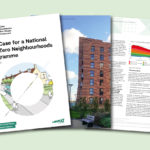Local authorities in the UK face significant challenges in funding the net zero transition. In response, 3Ci proposes the Net Zero Neighbourhoods model, an innovative concept that packages net zero projects together — such as residential retrofit and waste management — to attract private sector investment.
3Ci — the Cities Commission for Climate Investment — has published its new report advocating the case for a National Net Zero Neighbourhoods programme.
Developed by 3Ci with support from the Department for Energy Security and Net Zero, and the public and private sectors, this comprehensive report provides an outline business case for the delivery of Net Zero Neighbourhoods across the UK.
3Ci is a partnership between Connected Places Catapult, Core Cities UK, London Councils, Key Cities, Scottish Cities Alliance and supported by Department for Energy Security and Net Zero and the Local Government Association.
Net Zero Neighbourhoods is a new concept that integrates local net zero projects into attractive investment propositions by creating scale and long-term certainty for investors, thereby joining up the different types of assets that are important to decarbonisation. This includes transforming transportation, energy, housing and waste services in a coordinated way, using a blended finance model capable of attracting capital from banks, pension funds and other institutional investors. Importantly, 3Ci’s proposals include a programme of technical assistance and capacity building to ensure projects are of investment grade.
3Ci’s Net Zero Neighbourhood model has a special focus on residential retrofit, one of the biggest sources of emissions in the UK. Here, a core problem is that every neighbourhood has a different mix of housing types and tenures, which makes collective investments needed to decarbonise neighbouring homes difficult. Evidence shows it is also unlikely that most homeowners will pay toward retrofit, increasing the need for public subsidy.
But the new approach can address residential retrofit at no cost to the homeowner or tenant and reduce the need for public subsidy from around 70-80% to 35%. It does this by creating a revenue stream from energy savings over the long-term. which is attractive to capital investors, blending their contributions with smaller amounts of public subsidy in an investment vehicle. The model also allows for a saving to be passed to the householder, or used to target fuel poverty, helping a just transition to net zero.
3Ci has calculated the cost of achieving local net zero at over £200bn just for London and the 11 UK Core Cities — for the whole of the UK that figure is closer to £1 trillion, a figure way beyond the ability of public finances to address. Without bringing private capital into local net zero projects the UK will fail to meet its decarbonisation targets, and it is exactly this gap which 3Ci is designed to fill. 3Ci’s model aims to turn the cost of net zero into an opportunity, to bring significant additional investment, jobs and green growth to UK plc, delivering local environmental and health benefits, alongside community wealth-building.
Local authorities have projects which can deliver net zero and the investment community has demonstrated a growing interest in financing them, but too often these projects are not of investment grade. 3Ci’s approach therefore also offers technical assistance and capacity building to improve the standard of projects, alongside a platform to bring investors and project owners together.
Recognising these needs, opportunities and challenges, 3Ci’s new report makes the case for a multi-asset approach that avoids only cherry-picking projects that make the biggest returns, reduces the need for public subsidy and has no cost for the householder, improving the chances of community buy-in.
The report recommends a national programme of Net Zero Neighbourhood demonstrators to provide proof of concept, creating market and investor confidence.
Prof Greg Clark CBE, Chair of 3Ci and Connected Places Catapult, said: “The Net Zero Neighbourhood has several advantages over other methods of decarbonising places. It creates scale, certainty and an investable revenue stream, whilst building capacity for local authorities and enabling community buy in. Without the approach that 3Ci has developed, both within this model and its wider work, the UK will be far less likely to attract the capital needed to achieve its net zero ambitions.”
He adds that 3Ci has set up a Net Zero Investment Task Force of private investors, is creating a Net Zero Neighbourhood Community of Practice, and developing a ‘pitch-book’ of projects, bringing together places and projects that are either developing schemes which have some of the features of a Net Zero Neighbourhood, or have the ambition to do so.
Greg Clark CBE continues: “Nowhere yet has the ability to undertake a full Net Zero Neighbourhood project however, so our goal is to also set up full demonstrators capable of testing this model. The prize will be a major shift in investor appetite for net zero, shifting the market fundamentally toward this type of model, mitigating the existential threat of climate change whilst creating local jobs and other benefits. This is an area where the UK can be truly world leading, and we must now focus together on realising this opportunity.”
As a next step, 3Ci is seeking local authorities that are interested in working with them to develop demonstrators of the Net Zero Neighbourhoods concept. Local authorities have until 5th July to register their interest.










